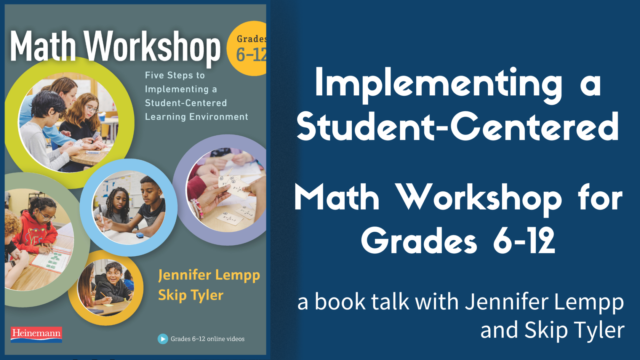
During the month of April, we will examine the place that assessment has in the lives of both educators and students. Keep this question in mind as you view, read, and share thoughts from this month's content: In what ways can we assess what we value? Today's post by Katherine Bomer is from Heinemann's Digital Library.
by Katherine Bomer
What About Grades?
Most of us can relate to the anxiety around this question. Unfortunately, we must confront required grading and testing even as we still try to open up possibilities of teaching writing. There is a disconnect between what we know to be powerful teaching and what the current politicized education system tells us to do to measure learning with rubrics, numbers, and letters in the name of holding teachers accountable for teaching and students accountable for learning.
In this segment, you will watch a group of teachers and administrators wrestle with this disconnect as they consider what works best for the students they teach. They talk honestly about the difficulty of wanting to nurture young writers while at the same time being responsible to grade and prepare for rubric scores on the state writing tests. While there’s not one perfect answer to this dilemma, the group becomes excited about a new idea for evaluating writing that you might also want to try.
You’ll hear these teachers come to certain collective realizations about grading:
- No numbers or letters. They’re a lie. You are in charge of your grades. You’re not in charge of the school tests, but at least you can control what happens in your classroom.
- Value the process rather than the product. Instead of valuing conventions, value risk taking. Assess student intention so that you can build from student intention. Check to see if you’re grading what you value. Create your own rubrics.
One thing you probably noticed about this discussion is how tense everyone feels, and how there’s always another layer, another point of view. Maybe we can decide that it’s inevitable that we’re going to feel uncomfortable with this reality of evaluation, but that our classrooms will remain a space where kids can grow as writers.
Try This: What would it mean to change some of the processes of evaluation in our classroom? Identify the ways you evaluate student writing and consider which ways are effective and which could be replaced with better practices.
Create ways of evaluating a student’s process as a writer. Have students write reflections on their process as a writer for each piece that they revise to a “finished” piece. Review the reflection, the artifacts from their process, and the finished piece and use those to share with the student what you are observing about her as a writer or, better yet, ask the student to examine these pieces written over the course of the school year and tell you what she has observed about herself.
Create teacher- and student-generated rubrics that reflect the writing process—daily writing, generating ideas for texts, trying a variety of genres and styles, using mentor texts, trying out new revision strategies, organizing tools, and attention to surface features of writing in editing—rather than focusing on the finished product.
Collaborate with Other Teachers: As a group, examine a department, school, or state rubric for writing. Pay particular attention to the language used in the lowest and highest scoring categories. If you were a student receiving this score, would you know what to do next to become a better writer? What are some of the limits of this tool?
--
 Katherine Bomer, author of Hidden Gems and Starting with What Students Do Best, is one of the field’s most gifted writers as well as one of its most gifted teachers of writing. In more than two decades of teaching and consulting, she has used her writers’ eye to focus on how craft isn’t just an instructional goal but an instructional tool that allows writers to go grow well beyond the range of most publicly available assessments.
Katherine Bomer, author of Hidden Gems and Starting with What Students Do Best, is one of the field’s most gifted writers as well as one of its most gifted teachers of writing. In more than two decades of teaching and consulting, she has used her writers’ eye to focus on how craft isn’t just an instructional goal but an instructional tool that allows writers to go grow well beyond the range of most publicly available assessments.
♦ ♦ ♦ ♦
Wondering where to connect online? Start by signing up below for Heinemann's Online PLC! Each week, we'll share content from the Heinemann Digital Library as food for thought and discussion. Our conversations can occur in comments here on the blog, on Twitter using #OnlinePLC or in our Facebook Group. Looking forward to sharing content, conversation and camaraderie!
♦ ♦ ♦ ♦



